Traditional medicine has been a cornerstone of healthcare in many cultures for centuries, relying on the natural healing properties of herbs and plants to address a wide range of ailments. These ancient systems of medicine have stood the test of time, offering effective and holistic solutions to various health issues. In this article, we will delve into the healing power of herbal ingredients in traditional medicine and discover their remarkable medicinal properties.
1. The Rich History of Herbal Medicine
Herbal medicine has a long and storied history, with roots tracing back to ancient civilizations like Ayurveda in India, Traditional Chinese Medicine (TCM), and Native American healing practices. These traditions have harnessed the medicinal properties of herbs to treat everything from common colds to chronic diseases, proving the enduring efficacy of herbal remedies.
2. Natural Healing Properties
One of the key benefits of using herbal ingredients in traditional medicine is their natural healing properties. Unlike synthetic drugs, herbal remedies are derived from plants and contain a complex blend of compounds that work in harmony with the body. This natural synergy often leads to fewer side effects and a gentler healing process.
3. Versatility of Herbal Ingredients
Traditional medicine systems utilize a vast array of herbal ingredients, each with its own unique set of healing properties. For example, ginger is renowned for its anti-inflammatory and digestive benefits, while turmeric’s powerful anti-oxidant and anti-inflammatory properties make it a staple in Ayurvedic and TCM practices. Highlighting these specific uses in your wellness routine can enhance your overall health.
4. Personalized Treatment Plans
Traditional medicine often focuses on individualized treatment plans, tailoring remedies to a person’s specific constitution and health condition. This personalized approach recognizes that each individual is unique and that herbal ingredients can be customized to address their specific needs.
5. The Modern Resurgence of Herbal Medicine
In recent years, there has been a resurgence of interest in traditional medicine and herbal remedies. People are increasingly seeking natural alternatives to synthetic drugs, driven by a desire for holistic well-being and a growing body of scientific evidence supporting the effectiveness of herbal ingredients.
6. Integrating Traditional and Modern Medicine
Many healthcare practitioners are now recognizing the value of integrating traditional medicine with modern healthcare. This integrative approach, often referred to as complementary and alternative medicine (CAM), harnesses the healing power of herbal ingredients alongside conventional treatments to achieve the best of both worlds.
Conclusion
The healing power of herbal ingredients in traditional medicine is a testament to the wisdom of ancient healing traditions. Their natural properties, versatility, and personalized approach make them a valuable resource for those seeking holistic well-being. As interest in herbal remedies continues to grow, the bridge between traditional and modern medicine strengthens, offering a promising future for those looking to explore the world of natural healing.
Incorporating herbal ingredients into your healthcare routine can be a holistic and effective way to maintain and enhance your well-being. Explore the rich history and diverse range of herbal remedies available in traditional medicine systems, and experience the transformative benefits they have to offer.
